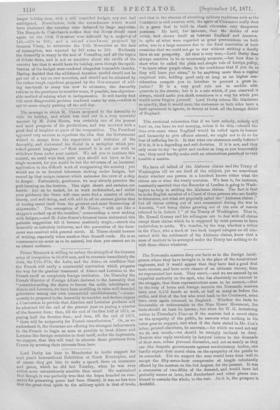Lord Derby has been to Manchester to invite support for
next year's International Exhibition at South Kensington, and of course they got him to make a speech there on commerce and peace, which he did last Tuesday, when he was even rather more ostentatiously sensible than usual. He maintained that though it was perfectly true that the hopes founded on com- merce for preserving peace had been illusory, it was no less true that the great rival spirit to the military spirit is that of trade, and that in the absence of absorbing military traditions such as the Coutinent is still overrun with, the spirit of Commerce really does do a great deal to hold in cheek otherwise very dangerous passions. He held, for instance, that the dislike of war which bad shown itself ae between England and America, in spite of what were regarded as great provocations on both sides, was in a large measure due to the fixed conviction of both countries that we could not go to war without striking a deadly blow at our prosperity. All that is very true,—Lord Derby does always contrive to be so vexatiously accurate,—but how does it show what he called the plain and simple rule of foreign policy, "to leave other people alone, in the confidence that if you do so they will leave you alone," to be anything more than a capital empirical rule, holding good only so long as no higher con- sideration compels you to interfere to prevent a gross in- justice ? It is a very good rule not to meddle with quarrels in the streets ; but it is a rule which, if you observed it always, would make you skulk sometimes in a way for which you would never forgive yourself. Lord Derby echoes Mr. Gladstone so exactly, that it would seem the statesmen on both sides have a tacit agreement to ignore, in theory at least, all the foreign duties of England.






























 Previous page
Previous page